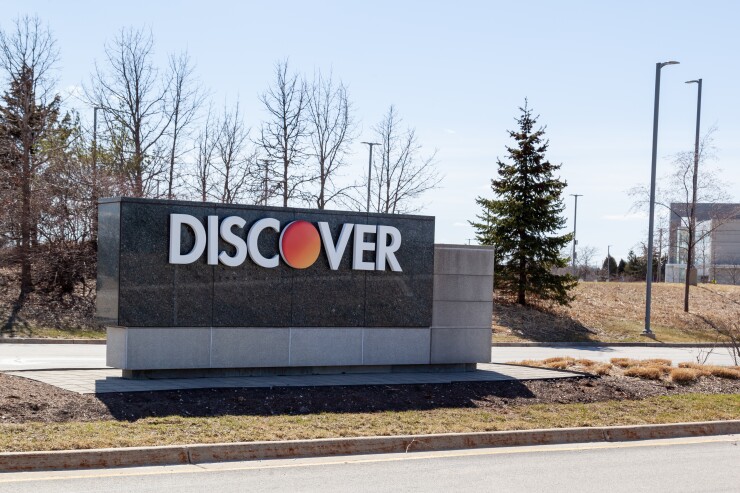Discover Financial Services has agreed to pay Capital One Financial $1.38 billion if it ditches their planned merger for a competing offer, according to disclosures the companies filed Thursday.
The hefty break-up fee would not apply if regulators block Capital One's
The acquisition's
But it also may depend on whether Discover, which has long been seen as a valuable acquisition target, gets a better offer from another company. The agreement says Discover can't actively solicit other deals but leaves the door open for others to bid on Discover. If it does accept another bid, the company would have to pay the break-up fee.
The two companies are also subject to the $1.38 billion break-up fee if their boards change their recommendations on the deal. CNBC
At roughly 4% of the deal's value, the break-up fee between the two is generally in line with other bank deals even if it's "probably at the upper end," according to Chip MacDonald, a veteran bank lawyer who focuses on mergers and acquisitions.
The termination fee between SunTrust and BB&T, the two banks that merged to form Charlotte-based Truist Financial, was also roughly 4%.
Terminations don't happen often. The last big one was the scuttled merger between TD Bank Group and Tennessee-based First Horizon, a deal with several regulatory delays that ultimately was called off.
TD, whose parent company is the Canadian banking giant Toronto-Dominion Bank, paid First Horizon $200 million when the companies agreed to cancel the deal. The Wall Street Journal
Battle lines are already being drawn on the Capital One-Discover deal, with some consumer groups and Democratic lawmakers calling on regulators to block it.
Opponents argue it would create the largest credit card lender in the country, while others say Capital One's ability to scale Discover's payments network may help it better compete against its much-larger rivals Visa and Mastercard, breaking their effective duopoly.
Banks typically discuss mergers with regulators before they announce their plans publicly, a factor that makes analysts think regulators didn't reject the idea outright.
Capital One "generally tends to be conservative on these matters and wouldn't have announced a deal without having some comfort on a potential path to regulatory approval," Sanjay Sakhrani, an analyst at Keefe, Bruyette & Woods, wrote in a note to clients this week.
Asked about how regulators may view the deal, Capital One CEO Richard Fairbank told analysts Tuesday that "we believe that we are well positioned for approval" but could not discuss conversations with regulators.
The companies are aiming to close the deal in late 2024 or early 2025.
Isaac Boltansky, a policy analyst at BTIG, wrote in a research note Monday that the deal would face a hard look from regulators for several reasons.
"Our sense is that this potential deal could ultimately secure regulatory approval, but it would face gale-force headwinds from a Washington that is deeply skeptical of consolidation, anxious regarding consumer-facing issues in an election year, and reticent regarding shifts in the payments ecosystem," Boltansky wrote.






